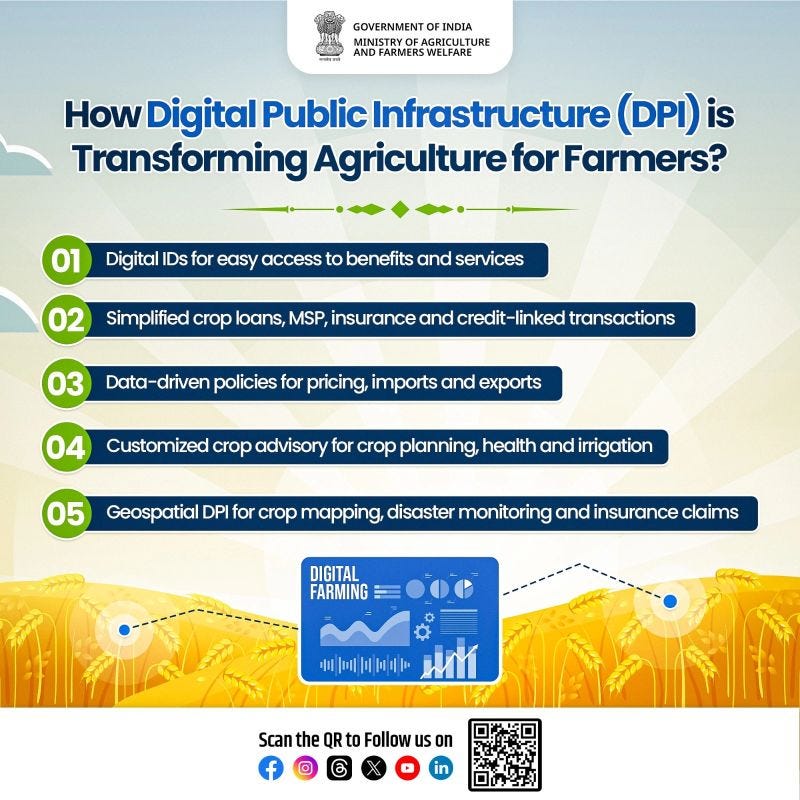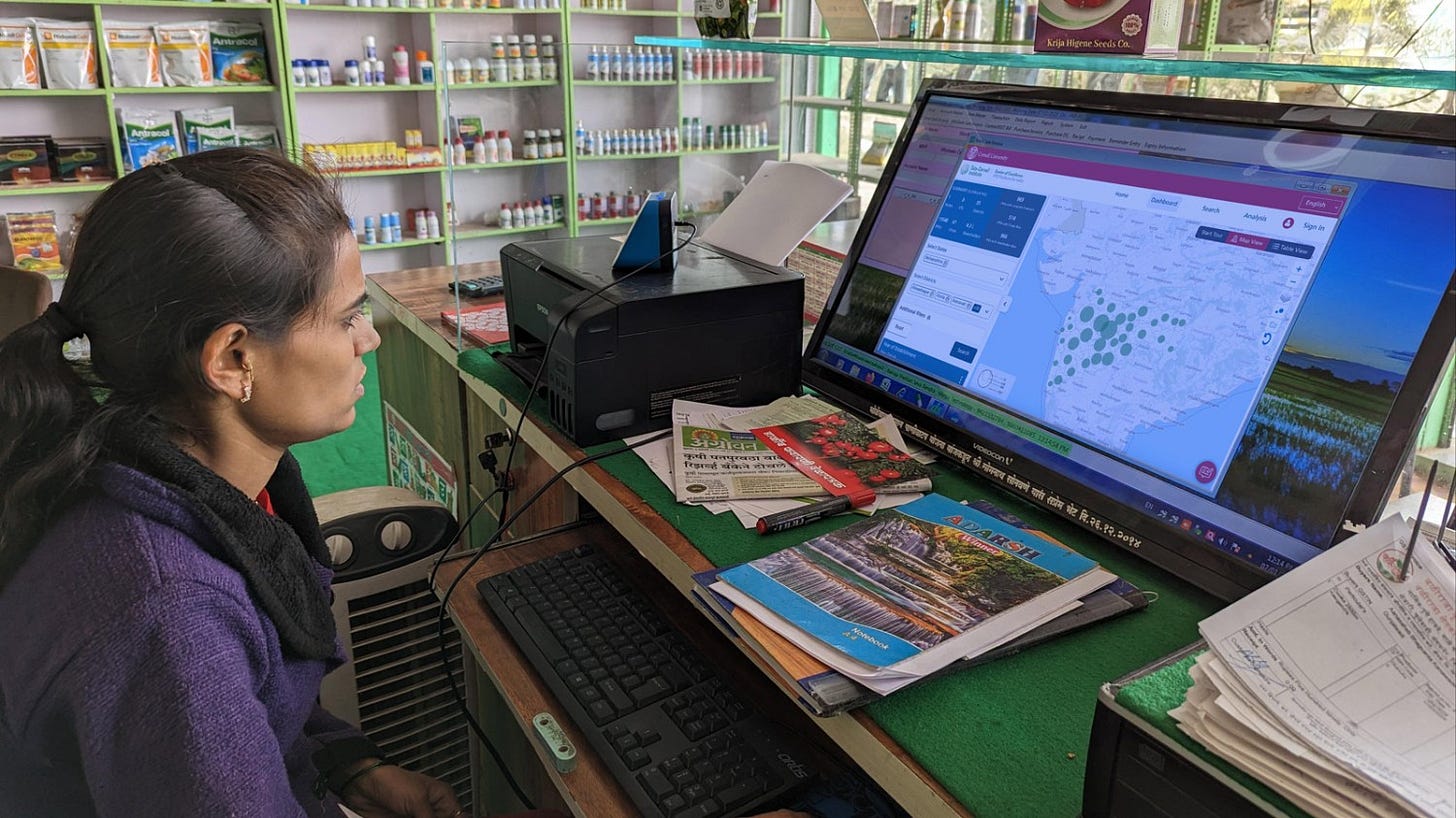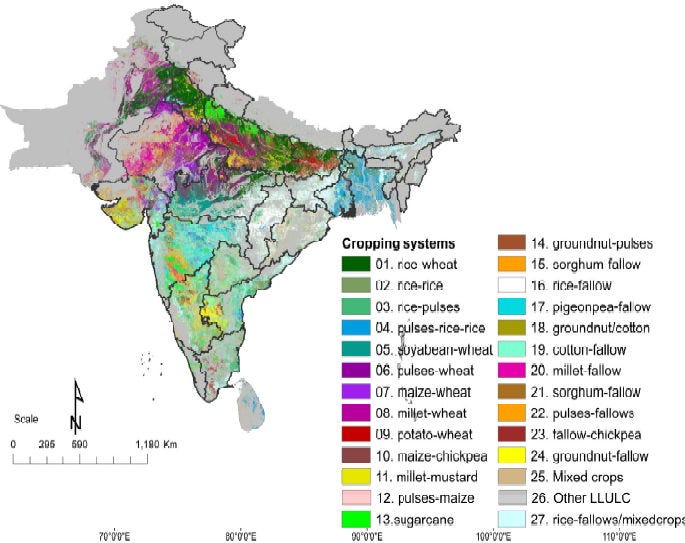Digital Agriculture in LMICs -12 Sep #66
Another busy week in Indian agritech as govt. pushes forward with Digital Agriculture Mission, while Walmart Fdn. awards new grants and DeHaat partners for drone services
30/08/24
DeHaat partners with AVPL for farmer drone services in India
Indian agritech DeHaat has joined forces with local drone company AVPL International to support smallholder farmers. Over the next three years AVPL will be deploying its Drone-as-a-Service (DaaS) solution at DeHaat centres, enabling precision agriculture. DeHaat is India’s largest digital agri-food marketplace. It operates through a “phygital” model, supported by its network of DeHaat Centers and Farmer Producer Organisations (FPOs). According to the latest data, DeHaat operates through 15,000+ centres and supports 503 FPOs, serving over 2.7 million farmers. DeHaat also offers AI-enabled crop advisory for 30+ crops in regional languages. The partnership with AVPL will extend to opening stores in agricultural markets (mandis) owned by state governments, in association with the National Council of State Agriculture Boards. Founded in 2012, DeHaat has to date raised a total funding of USD 222 million over 10 rounds, according to Tracxn.
02/09/24
Government of India pushes forward with Digital Agriculture Mission
On September 2, the Government of India approved the 'Digital Agriculture Mission' (DAM) with a financial outlay of INR 28.2 billion (USD 336 million), including a central government share of INR 19.4 billion (USD 231 million). DAM is designed as an umbrella scheme to support various digital agriculture initiatives. It is built on two foundation pillars: AgriStack (Kisan ki Pehchaan) and the Krishi Decision Support System (Krishi-DSS). AgriStack is a farmer-centric Digital Public Infrastructure (DPI), which comprises a comprehensive database through records of farmers, land usage, and crop patterns. Krishi-DSS, on the other hand, will integrate remote sensing data on crops, soil, weather, and water resources into a comprehensive geospatial system. In addition, DAM’s support will extend to soil profile mapping, crop science and strengthening agri education, management and social Sciences.
An important enabler for DAM is the “Agri Fund for Start-Ups & Rural Enterprises” (AgriSURE) to provide support to agritechs and agribusinesses. This fund is expected to provide about INR 7.5 billion (USD 89.6 million) and will support innovators through both equity and debt investments. As anticipated by ArisTechia, AgriSURE will be managed by NABVENTURES, a venture growth equity fund that invests in agriculture, food, rural businesses and agri/rural financial services at early to mid-stages. NABVENTURES is a wholly-owned subsidiary of India’s National Bank for Agriculture and Rural Development (NABARD).
Image credit: Ministry of Agriculture & Farmers Welfare, Government of India
10/09/24
Walmart Foundation awards $2.78M agritech grants in India
The Walmart Foundation has announced three new grants totaling USD 2.78 million to advance digital agriculture innovation in India. One of the grantees is agritech startup Precision Development (PxD). Funding also went to the National Entrepreneurship Network (NEN), and Cornell University in support of the Tata-Cornell Institute for Agriculture and Nutrition (TCI). PxD is getting a USD 260,000 grant to bring its digital advisory service, Coffee Krishi Taranga (CKT), to the Coffee Board of India and provide to farmers in the states of cross Andhra Pradesh and Karnataka information on cultivation, price updates and coffee industry developments.
Image credit: Walmart Foundation
It will also support the integration of a voice-based, weather forecast service into CKT, and develop videos on agricultural practices for the Coffee Board. PxD has onboarded 90,000 farmers and aims to reach with the new grant 130,000+ farmers. NEN has been given a grant of USD 1.5+ million to develop innovative AI-based solutions for grain assessment (soybean) in Madhya Pradesh and Maharashtra. TCI has been awarded USD 990,000 for a range of new projects including accelerating the web-based My FPO Connect platform, a single-point source for data on over 33,000 Farmer Producers Organisations (FPOs).
07/09/24
Good reads (1): The role of geospatial mapping for sustainable agriculture in South Asia
The International Crops Research Institute for the Semi-Arid Tropics (ICRISAT) has published a new report highlighting the role of geospatial maps and satellite data in food security. The study, which focuses on South Asia, covers an area of 477 million hectares across India, Pakistan, Nepal, Bhutan, Bangladesh and Sri Lanka. ICRISAT has identified and mapped 27 major cropping systems. The research underscores how advanced geospatial mapping tools can enhance agricultural productivity and sustainability. Geospatial mapping is also used to shape policies that ensure the efficient distribution of resources like water, fertilisers, and seeds, based on the specific needs of different cropping systems. Additionally, these maps can be integrated into disaster management strategies, helping to identify areas vulnerable to agricultural stress, such as droughts or floods, and allowing for more targeted and effective responses. The research was funded among others by the Government of Japan through the Asian Development Bank (ADB).
Image credit: ICRISAT
04/09/24
Good reads (2): AGRA explores private sector role in transforming African food systems
AGRA has launched its 2024 Africa Agriculture Status Report (AASR24), a study which focuses on the role of the private sector in African food systems. The study highlights how digital technologies are enabling medium and large-scale agribusinesses to create new business models and platforms that reduce search and transactions costs, create efficiencies, and enhance value chain actors’ access to productive inputs, information, and markets. Despite the promise of inclusive digital transformation, the study highlights how the potential for impact is limited by several constraints, including low usage rates for mobile internet. According to AGRA, this is partly because smallholder farmers in Africa experience comparatively higher data costs compared to other parts of the world, a situation worsened by the fact that 40 percent of the continent is under the “extreme poverty line”. The study also advocates for using digital technology to reduce transaction costs and underlines the importance of using digital platforms to provide farmers and intermediaries with access to information, extension, and credit. Digital agriculture, states AGRA, can make agribusinesses and agri value chains more efficient and competitive at a global level.






